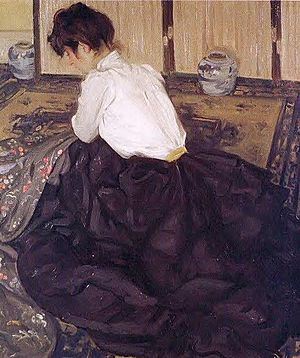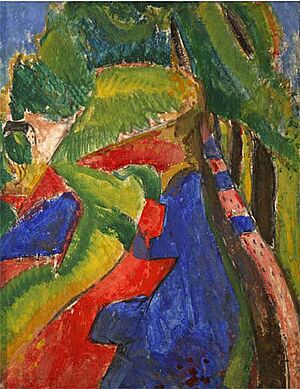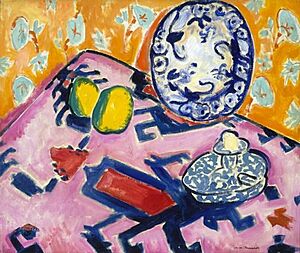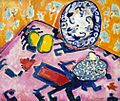Alfred Maurer facts for kids
Quick facts for kids
Alfred Henry Maurer
|
|
|---|---|

An Arrangement, 1901, oil on cardboard
|
|
| Born | April 21, 1868 |
| Died | August 4, 1932 (aged 64) |
| Nationality | American |
| Known for | Painting |
Alfred Henry Maurer (born April 21, 1868 – died August 4, 1932) was an American painter. He was known for his modern art style. Maurer showed his artwork in new and exciting art groups in the early 1900s. These groups were called "avant-garde."
Contents
Early Life and Art
Alfred Maurer was born in New York City. His father was a German lithographer. A lithographer is someone who makes prints using a special stone or metal plate.
When Maurer was sixteen, he left school. He started working at his father's company. In 1897, Maurer moved to Paris, France. He lived there for four years. In Paris, he joined a group of American and French artists. At this time, Maurer painted in a realist style. This means his paintings looked very much like real life.
A Famous Painting
Maurer briefly came back to New York. He wanted to show his father that he could be a painter. His father was not sure about his art career. Maurer painted one of his most famous works, An Arrangement. He used a neighbor as his model. He finished the painting in just a few hours. He even painted it on a borrowed piece of cardboard.
This painting won first prize in 1901. It was at the Carnegie International Exhibition. Maurer also won other awards. He received the Inness Jr. prize in 1900. He won a bronze medal at the Pan-American Exposition in 1901. In 1905, he won a medal at the Liège International Exposition. He also won a gold medal in Munich.
Changing His Style

When Maurer was 36, he was still in Paris. He completely changed his painting style. From then on, he painted in the Cubist and Fauvist styles.
- Fauvism used bright, bold colors. Artists painted with strong brushstrokes.
- Cubism broke objects into geometric shapes. It showed different angles at once.
By 1909, Maurer was an important American "avant-garde" painter. He had an art show with another artist, John Marin. This show was in New York City at the 291 Gallery. Four of his paintings were also shown in the famous Armory Show in 1913.
Later Years
Maurer left Paris just before World War I started. He moved back to his father's house. But his father did not support his art. For the next 17 years, Maurer painted in a small room. This room was in his father's house. He did not get much praise for his art during this time.
However, he still showed his work. He took part in exhibitions at the Anderson Galleries. He also showed his art regularly at the New York Society of Independent Artists. He was even chosen as their director in 1919. In 1924, an art dealer named Erhard Weyhe bought all the art in Maurer's studio. Weyhe then represented Maurer for the rest of his life.
See Also
- List of American painters
Images for kids




